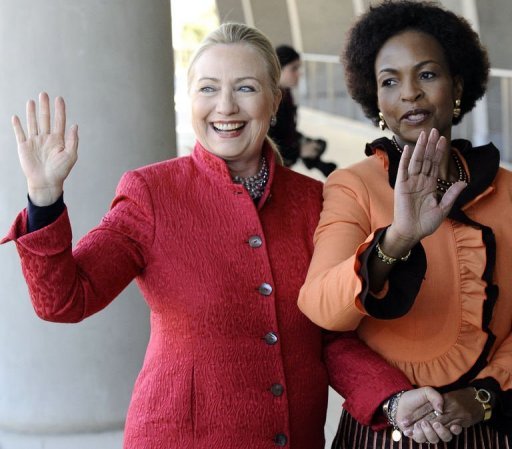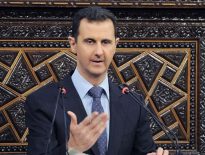US Secretary of State Hillary Clinton on Tuesday called on South Africa, the continent’s leading democracy, to play a more influential role in African and global issues. “We are looking for ways to enhance and deepen our partnership. South Africa has so much to offer to the rest of the world,” Clinton said as she met with Foreign Minister Maite Nkoana-Mashabane.

“As crises and opportunities arise, there are tough issues we have to tackle together, from nuclear proliferation to climate change, security crises, the situation in (the Democratic Republic of Congo) or Syria. “We do not always see eye to eye on these issues. I don’t know if people always do and certainly not two nations. Sometimes we will disagree as friends do,” she said. A senior State Department official said Clinton — on the sixth leg of a marathon tour of the continent — wants to “encourage South Africa to play a stronger and more influential role” in global affairs. The two countries have appeared at odds on issues such as sanctions on Iran and the conflicts in Syria and Libya.
South Africa, which currently holds a rotating seat on the UN Security Council, last month abstained from a heated vote on sanctions against Syria backed by the United States and European nations. Pretoria said it wanted a more balanced approach and measures to prod the rebels to comply with the proposed peace plan. South Africa often urges longer negotiations to resolve conflicts, citing its own success in negotiating an end to white-minority rule and a transition to all-race democracy. And the country “gets very nervous when words like regime change get mentioned. We are not nervous about those words,” said the State Department official.
Outside the differences in tactics, “fundamentally the US and South Africa share the same values,” the official added.
A key part of Clinton’s trip is also to promote trade between the United States and South Africa, one of the five members of the BRICS group of world emerging economies, together with Brazil, Russia, India and China.
China in particular has made major inroads in trade and investment across Africa, but also raised hackles with its stern approach to labour relations.
Beijing has also faced accusations that its presence in Africa is simply to extract resources to feed its own growing economy.
“Part of our strategy toward sub-Saharan Africa is to build partnerships that add value rather than extract it. So we’re ramping up our efforts to spur economic growth through increased trade and investment across the region,” Clinton said.
“Economic growth will help the United States build partnerships to benefit countries throughout Africa, and it will help South Africa strengthen its role as a global and regional leader.”
Nkoana-Mashabane said South Africa wants to promote greater trade that creates more jobs through processing raw materials at home.
“From South Africa’s point of view, we look at compatibility and collaboration and we agreed with both of our partners, the US and China, that the time for just… the extraction of mineral resources on continent has ended,” the minister said.
“Leaders of this continent would want partners to come in (who) would help us to beneficiate on our natural resources,” she added.
“We love this love affair that is coming. It is welcome from both East and West, as long as we agree on the terms determined by us.”





